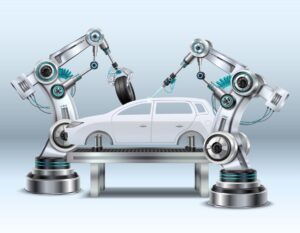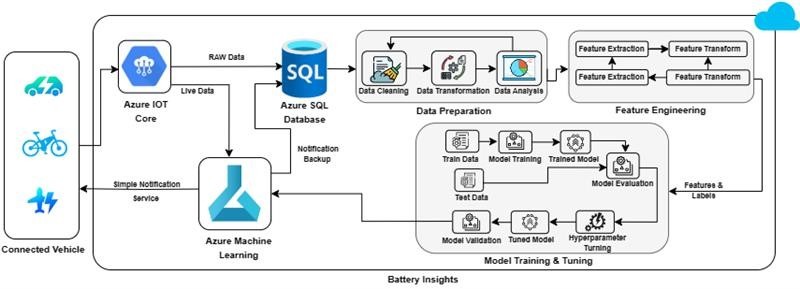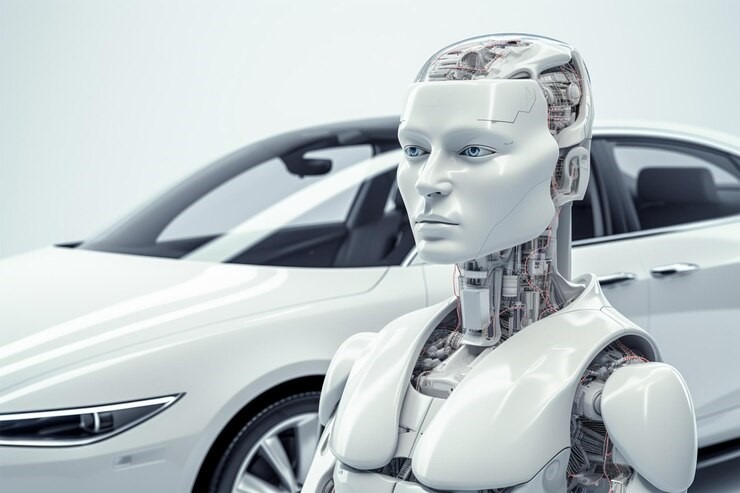ML’s Impact on Advancing Automotive EVs

The automotive industry is currently in the midst of a profound transformation, with electric vehicles (EVs) leading the charge toward a more sustainable and eco-friendly future. As automakers across the globe gear up to meet the rising demand for EVs, advanced machine learning (ML) is emerging as a key enabler, propelling the sector into a new era of innovation and performance. In this comprehensive blog post, we will take an in-depth and technical journey into the transformative role of advanced machine learning in the automotive EV sector, examining cutting-edge technological innovations, and providing a broader perspective on the implications of this evolving landscape.
Machine Learning’s Crucial Role in EV Advancement
Before we dive into the technical intricacies, let’s understand the fundamental role of machine learning in the electric vehicle industry.
Machine learning, a subset of artificial intelligence, empowers machines to learn and make decisions by processing and analyzing data. In the context of electric vehicles, ML is a multifaceted tool that goes far beyond traditional automotive engineering. It plays a pivotal role in multiple aspects, enhancing performance, safety, energy efficiency, and the overall driving experience.
Battery Management and Optimization
- Data-Driven Insights: Machine learning algorithms continuously monitor and optimize the performance of EV batteries. These algorithms process data related to temperature, charge cycles, and usage patterns to predict battery health and provide real-time recommendations for charging, discharging, and thermal management.
- Extending Battery Life: The result is not only optimized energy utilization but also the extension of battery lifespan, addressing a key concern for EV owners.
Range Prediction and Optimization
- Eliminating Range Anxiety: Machine learning algorithms predict range with remarkable accuracy. By factoring in variables like driving habits, weather conditions, and traffic patterns, these algorithms offer real-time range estimates. This helps drivers plan their journeys more effectively and alleviates range anxiety, a common concern among EV users.
Safety and Autonomous Driving
- Advanced Driver-Assistance Systems (ADAS): ML is instrumental in the development of advanced driver-assistance systems, enhancing safety in electric vehicles. These systems rely on ML algorithms for object detection, lane keeping, adaptive cruise control, and other critical safety features.
- Towards Full Autonomy: The foundation laid by ML-driven ADAS systems paves the way for full autonomy in the future. EVs are increasingly becoming intelligent, self-driving machines, thanks to machine learning’s continuous learning capabilities.
Energy Recovery and Regeneration
- Optimized Regenerative Braking: Machine learning models analyze data related to driving behavior and traffic conditions to determine the ideal moments to engage regenerative braking. This energy recovery process captures and stores energy during deceleration, contributing to increased efficiency and longer battery life.
Charging Infrastructure and Grid Management
- Grid Optimization: Machine learning is not limited to the vehicle itself. It also plays a crucial role in the development of charging infrastructure and grid management. Predictive algorithms anticipate charging demand and adapt to grid conditions, optimizing the charging process for EV owners. This reduces charging times and minimizes the strain on the electrical grid.
Predictive Maintenance
- Proactive Maintenance: Predictive maintenance is a game-changer for electric vehicle manufacturers. Machine learning algorithms analyze sensor data from various vehicle components to identify potential issues before they lead to breakdowns. This proactive approach reduces maintenance costs, improves vehicle reliability, and enhances driver satisfaction.

Innovative Applications of Machine Learning in EVs
As we venture deeper into the technical landscape, it’s crucial to highlight some of the innovative applications of machine learning in electric vehicles that are shaping the future of mobility.
-
Natural Language Processing (NLP)
Machine learning has powered voice-activated systems in EVs. These systems are becoming increasingly sophisticated, enabling drivers to interact with their vehicles more naturally. They can perform tasks such as adjusting climate control, navigation, and entertainment systems with voice commands.
-
Energy-Efficient Route Planning
Machine learning-driven route planning is taking electric vehicles to the next level. These algorithms consider factors such as elevation changes and traffic conditions to determine the most energy-efficient path for EVs. This feature not only maximizes range but also minimizes energy consumption during trips.
-
Interior Comfort Optimization
Machine learning processes sensor data from within the vehicle to automatically adjust settings for interior comfort. This includes personalized climate control, seat adjustments, and even cabin fragrances based on driver and passenger preferences.

Challenges and Considerations
Amid this wave of technological advancements, it’s crucial to address the challenges and considerations that come with integrating machine learning in electric vehicles.
-
Data Privacy and Security
The collection and analysis of vast amounts of data from electric vehicles raise concerns about data privacy and security. Manufacturers must implement robust safeguards to protect sensitive information and ensure compliance with data protection regulations.
-
Hardware and Computing Power
Implementing advanced machine learning algorithms requires increasingly powerful onboard computing hardware. This introduces considerations related to energy efficiency and heat management to avoid draining the vehicle’s battery.
-
Scalability and Compatibility
Manufacturers need to ensure that ML algorithms are scalable and compatible with various EV models. This requires standardized data formats and interfaces to enable seamless integration of new features and updates across different vehicle lines.
-
Regulatory Compliance
The deployment of machine learning in EVs must adhere to regulatory standards. Manufacturers need to work closely with regulatory bodies to ensure that their systems meet safety and performance requirements while also remaining compliant with evolving regulations in the automotive industry.
The Road Ahead: Collaborations and Innovations
Overcoming these challenges and fully harnessing the potential of machine learning in the EV sector requires close collaboration between automakers, tech companies, and research institutions. Innovations in hardware, software, and data management will be instrumental in driving the industry forward.
Optimizing battery performance and management is crucial in addressing challenges associated with IoT device batteries. Our trained model effectively predicts outcomes on new data, and the Battery Insights module leverages its output to generate valuable insights into IoT device battery life. These insights not only offer a comprehensive understanding of battery performance but also inform strategic enhancements in device design. By tackling battery management challenges proactively, we aim to enhance the overall efficiency and longevity of IoT devices in the below architecture diagram.

The architectural illustration depicts a cloud computing system leveraging Azure App Service for web application hosting and Azure IoT Core for IoT device connectivity and management.
The web application employs Raw Data from IoT devices for feature extraction and transformation. The Feature Extraction process discerns vital features like temperature, humidity, and vibration. Feature Transform converts these features into a format compatible with the machine learning model, storing it in an SQL database for data analysis and model training.
Azure Service Bus facilitates communication between the web application and IoT devices, ensuring reliable and secure interactions. Azure IoT Core enables secure communication between IoT devices and the cloud, while the Notification module sends user notifications based on machine learning model outputs.
After completing the training and tuning process, the resulting model is deployed to the Trained Model module. This trained model predicts on new data and the Battery Insights module utilizes its output to generate insights into IoT device battery life, informing device design enhancements.
In its entirety, the architectural diagram illustrates a thoughtfully crafted cloud computing system. It utilizes Azure App Service, Azure IoT Core, and Azure Service Bus, ensuring the secure and reliable hosting of a web application, effective management of IoT devices, and the execution of data analysis and machine learning processes.
The successful implementation of a robust Battery Management system by Sankey Solutions speaks to the company’s demonstrated expertise in delivering effective solutions. This achievement not only underscores Sankey Solutions’ commitment to providing high-quality services in the specialized field of Battery Management but also serves as a testament to the company’s capabilities and dedication in meeting the unique and demanding needs of its prestigious clients. The accomplishment reflects Sankey Solutions’ position as a trusted and reliable partner in delivering innovative solutions for optimal battery performance and management.

Conclusion
In this technical and comprehensive exploration, we have unveiled the transformative role of advanced machine learning in advancing the automotive EV sector. From battery management and range prediction to autonomous driving, energy recovery, and innovative applications like NLP and energy-efficient route planning, machine learning is redefining the electric vehicle landscape.
As electric vehicles continue to gain momentum in the automotive market, the role of machine learning will become increasingly pronounced. The road ahead promises further innovations and advancements that will not only benefit EV owners but also contribute to a cleaner and more sustainable future of transportation. This remarkable journey holds immense promise and potential, and it is through the fusion of machine learning and electric vehicles that we are steering toward a more innovative, efficient, and eco-friendly driving experience.
– Kalpana Sha Iyer
Business Head – UK | Europe
kalpana.s@sankeysolutions.com